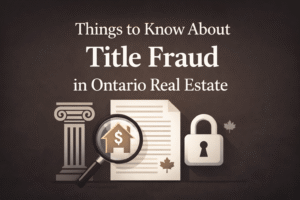Purchasing or selling property is one of the most significant financial transactions many Canadians will undertake in their lifetime. Whether you’re a first-time homebuyer or a seasoned property investor, navigating the legal intricacies of real estate can be daunting. That’s where a real estate lawyer comes in. With specialized training in property law, these professionals guide you through contracts, title searches, financing conditions, and closing procedures to ensure your interests are protected and the transaction proceeds smoothly.
What Is a Real Estate Lawyer?
A real estate lawyer is a licensed legal professional who specializes in matters related to property transactions. Their expertise covers residential and commercial deals, land transfers, mortgages, zoning issues, easements, and more. Real estate lawyers possess in-depth knowledge of provincial and federal statutes governing land ownership, as well as the standard forms and procedures used by real estate boards and financial institutions across Canada. They serve as your advocate, ensuring that all legal requirements are met, risks are identified, and your rights are safeguarded.
What Does a Real Estate Lawyer Do for the Buyer?
For a buyer, a real estate lawyer’s role begins soon after an accepted offer. Key responsibilities include:
- Reviewing the Agreement of Purchase and Sale: Lawyers carefully examine the offer to ensure that terms accurately reflect what you negotiated—purchase price, closing date, inclusions, conditions, and any special clauses.
- Conducting Title Searches: A thorough search of public land records confirms the seller’s ownership and uncovers any liens, mortgages, or encumbrances that could affect your rights.
- Processing Mortgages: If you are obtaining a mortgage for your transaction, real estate lawyers ensure that the terms are in line with what you have agreed to with the lender, that lender conditions are met, and that there is a timely advance of the mortgage funds for your purchase.
- Explaining Legal Obligations: Buyers receive guidance on obligations such as property taxes, condominium status certificates (for condos), and adjustments for prepaid fees or utilities at closing.
By handling these tasks, a lawyer minimizes surprises and reduces the risk of inheriting undisclosed liabilities.
What Does a Real Estate Lawyer Do for the Seller?
Sellers rely on real estate lawyers to facilitate a clean transfer of title and to protect them against future claims. Typical services include:
- Preparing the Statement of Adjustments: Lawyers calculate prorated amounts for property taxes, utility bills, condominium fees, and other expenses, ensuring the buyer and seller each pay their fair share.
- Reviewing Buyer’s Conditions: When a sale is conditional on the buyer’s financing, inspection, or sale of their property, the lawyer monitors deadlines and ensures that all conditions are waived or fulfilled promptly.
- Providing Clean Title and Completing Payouts If there is an existing mortgage on the property, the lawyer handles the discharge process, obtains a payout statement from the lender, and ensures the mortgage is removed from title.
- Preparing Closing Documents: Sellers receive documents such as the deed (transfer of land) and undertakings for compliance with closing deliverables. This streamlines the final handover.
Through meticulous document preparation and coordination with the buyer’s lawyer, existing lenders, and the listing brokerage, the seller can close without lingering obligations or claims.
What Does a Real Estate Lawyer Do at Closing?
Closing is the culmination of weeks—or even months—of work. On closing day, a real estate lawyer typically:
- Coordinates Fund Transfers: Lawyers ensure that purchase funds from the buyer or their lender are received and disbursed correctly—to the seller, mortgage lender, real estate agents, and other parties as applicable.
- Registers Documents with the Land Registry Office: The lawyer submits and registers the transfer of title, mortgage registration, and any other required documents to make the transaction official.
- Delivers Lockbox Codes: Once registration is confirmed, the lawyer issues a closing letter and lockbox code or possession notice to the buyer, completing the transfer.
- Issues Final Statements: Both buyer and seller receive a detailed statement of adjustments and a final report summarizing all aspects of the transaction, including fees, taxes, and disbursements.
By managing these critical tasks, the lawyer ensures that both parties fulfill their obligations and the transaction is legally sound.
When Do You Need a Real Estate Lawyer?
Although legal representation is not mandatory in every province—some regions allow non-lawyer notaries or conveyancers—hiring a qualified real estate lawyer required in Ontario whenever:
- Purchasing or Selling Property: Residential or commercial.
- Refinancing a Mortgage: To handle new mortgage documents and discharge the old mortgage.
- Transferring Title Between Family Members: For gifting, inheritance, or changes in joint ownership.
- Resolving Title Disputes or Boundary Issues: When questions arise about easements, encroachments, or survey inaccuracies.
- Buying New Construction or Assignment Sales: To review builder agreements and protect against delays or defects.
Engaging a lawyer early in the process allows them to identify potential issues before they become costly problems.
How a Real Estate Lawyer Can Help with Complications
A variety of complications can derail real estate transactions. Lawyers bring problem-solving skills and legal acumen to address challenges such as:
- Title Defects: Old liens, unresolved disputes, or missing signatures can block registration. A lawyer can negotiate releases or correct documentation to ensure accuracy and completeness of the records.
- Non-Disclosure Issues: If property defects emerge after an offer is accepted, the lawyer can advise on options such as rescission, price renegotiation, or litigation.
- Financing Delays: Late mortgage approvals may require an extension agreement—lawyers draft and negotiate amendments to avoid breach of contract.
- Zoning or Compliance Concerns: Unexpected municipal orders or zoning restrictions can stall a deal; lawyers liaise with authorities to resolve compliance or apply for variances.
Their ability to navigate complex legal and procedural hurdles protects your investment and timeline.
How Much Does a Real Estate Lawyer Cost?
While exact fees vary based on location and transaction complexity, real estate lawyers typically charge a flat fee that covers standard services, including document preparation, title searches, registration, and closing attendance. Some may itemize disbursements—such as court filing fees, courier charges, and land transfer taxes—separately. Because each transaction is unique, lawyers often provide a fee estimate upfront, outlining what is included and any additional costs that could arise if complications occur. Discussing fee structures early ensures you understand the investment required for professional legal guidance.
Can a Real Estate Lawyer Represent the Buyer and Seller?
In Canada, rules on dual representation vary by province. In some jurisdictions, lawyers can act for both the buyer and the seller if both parties provide fully informed written consent and the lawyer is confident that no conflict of interest exists. However, dual representation can raise concerns about impartiality, especially when negotiating price, inspecting title issues, or interpreting contract clauses. In Ontario, most deals require that different lawyers represent the buyer and seller. If you are considering dual representation, discuss the implications carefully to ensure your interests are fully protected.
Buying or selling a property is a complex journey that involves significant legal, financial, and administrative steps. A real estate lawyer provides the expertise, oversight, and advocacy needed to navigate each phase—from drafting contracts and reviewing title searches to handling closing logistics and resolving disputes. By enlisting their services, you gain confidence that your transaction will be handled professionally, transparently, and in full compliance with Ontario property law.
Reach out to Prudent Law today to book a confidential consultation with one of our real estate lawyers in Mississauga.








